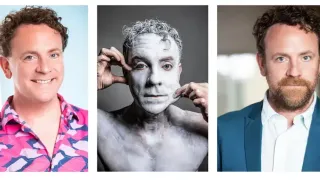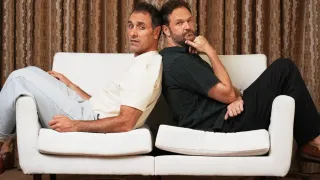
3 hours ago
Jesse Tyler Ferguson Reflects on “Modern Family," the Challenges of Gay Representation, and the "Tricky" Problem of Pleasing Queer Viewers
READ TIME: 2 MIN.
Jesse Tyler Ferguson, who portrayed Mitchell Pritchett on the groundbreaking sitcom “Modern Family” from 2009 to 2020, recently delved into the nuanced reception of his character—and the series as a whole—by queer viewers. Ferguson, himself an out gay man, played one half of a married couple raising an adopted daughter, a storyline that became a cultural touchstone during the fight for marriage equality in the United States. The series, lauded for its mainstream depiction of a queer family, won 22 Emmy Awards and helped shift public perceptions of LGBTQ+ families in popular media .
Despite these achievements, Ferguson revealed that the most vocal criticism he received did not come from anti-queer voices, but from within the community itself. Appearing on his podcast “Dinner’s On Me,” he recounted, “the criticism that I think I heard the loudest was always from the gay community, feeling as if, maybe, I didn’t represent their idea of what a gay relationship was, or a gay man was” .
Throughout the show’s 11-season run, Ferguson and his on-screen husband Cameron Tucker (played by Eric Stonestreet) faced scrutiny over certain aspects of their relationship. Notably, there was a 2010 Facebook campaign demanding more visible intimacy between the characters, as viewers felt the pair’s relationship lacked authenticity and was sometimes portrayed through stereotypes . Other critics highlighted moments they found offensive or reductive. Ferguson addressed these concerns directly, stating, “I’m representing one person. I’m in charge of this one character.” He emphasized that while his performance was rooted in his own experiences, it was never intended to serve as a definitive representation of all gay men or relationships .
Ferguson’s comments reflect a broader challenge faced by queer actors and creators: the expectation to both reflect and transcend the diversity of their communities. “The criticism that I think I heard the loudest was always from the gay community…as if maybe I didn’t represent their idea of what a gay relationship was or a gay man was,” he explained on the podcast . He acknowledged that “it was tricky to please gay audiences,” and that the desire was always “to do it with nuance and levels and layers and also poignancy” .
While Ferguson faced criticism, he also received praise for helping bring queer families into mainstream conversations. The show’s depiction of adoption, marriage, and family dynamics was seen as groundbreaking, even if imperfect . Ferguson himself was nominated five times for Outstanding Supporting Actor at the Emmys, and his character became a reference point for many viewers navigating their own identities.
"Modern Family"’s legacy continues to resonate: Aubrey Anderson-Emmons, who played Lily, recently used a memorable scene from the show to come out as bisexual on TikTok, demonstrating the ongoing power of representation—even when met with critique . For LGBTQ+ audiences, Ferguson’s candid reflections highlight an essential truth: representation is complex, subjective, and often contentious, but visibility itself can be transformative.






